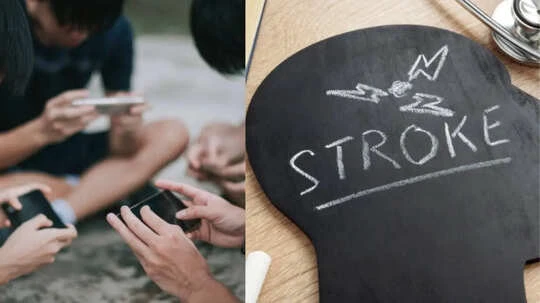A 19-year-old Chinese university student suffered a massive stroke after prolonged use of his mobile phone, which led to a blood clot forming in a cervical artery, blocking blood flow to his brain, according to doctors.
News reports say the doctors from Beijing treating the teenager attributed the stroke to an improper “text neck” posture, which warns that sustained neck bending leads to blood clots and severe consequences. The student is now recovering after the clot was surgically removed.
How did the stroke happen?
Doctors say Xiao Dong, a university student from Fujian Province, was addicted to playing games on his mobile phone and used to forward-tilt for a long time, which led to obstructed blood flow in the arteries of the neck. This obstruction caused the formation of a blood clot in the upper spinal arteries, ultimately leading to a life-threatening stroke.
According to news reports, two surgeries were performed on the student, after which the clot was removed.
What is a brain stroke?
A brain stroke is a medical emergency that happens when something prevents your brain from getting enough blood flow. A blocked blood vessel or bleeding in your brain causes strokes. Doctors sometimes refer to strokes as cerebrovascular accidents, or CVAs, or brain attacks. According to experts, strokes are the second leading cause of death across the world.
If you think you or someone you are with is having a stroke, you must immediately contact the emergency services in your area. Strokes are life-threatening and can be fatal, and so, the sooner someone gets diagnosed and treated, the more likely they are to survive a stroke.
Signs and symptoms of a stroke
While a stroke causes different symptoms depending on which area of your brain it affects, a few common symptoms include:
- Aphasia, or trouble speaking.
- Blurred vision or double vision
- Confusion or agitation
- Dizziness or vertigo
- Coma
- Severe headaches
- Loss of muscle control on one side of your face
- Memory loss
- Mood swings
- Nausea vomiting
- Neck stiffness
- Seizures
- Slurred speech
- Sudden worsening or loss of your senses
- Weakness or paralysis on one side of your body
What are the risk factors for stroke?
While anyone can have a stroke, there are some groups that have a higher risk, including people who:
- Are older than 65
- Smoking or using other forms of tobacco or nicotine
- Use recreational or nonprescription drugs.
- Having certain health conditions can increase your stroke risk, including:
- Alcohol use disorder
- COVID-19
- Frequent migraines
- High blood pressure
- High cholesterol
- Type 2 diabetes
